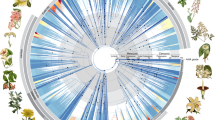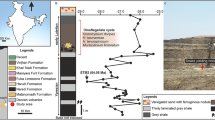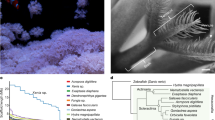Abstract
A ‘PARTHENITA’ containing furcocerous and tailless stages of a gymnophalline cercaria was found in the hæmolymph spaces of the digestive gland, gonad and gonoduct of the gastropod Littorina saxatilis. The unique feature of this ‘parthenita’ is that it has the same essential structure as the cercariæ which it produces. It is not yet possible to decide whether this ‘parthenita’ is, in fact, a cercaria possessing the kind of multiplication more usually associated with a redia or sporocyst; or whether it is a sporocyst or redia with a structure similar to a cercaria. Until this is decided the word ‘parthenita’ will be used here to indicate an analogy with the more usual redia or sporocyst found in digenetic trematodes.
This is a preview of subscription content, access via your institution
Access options
Subscribe to this journal
Receive 51 print issues and online access
$199.00 per year
only $3.90 per issue
Buy this article
- Purchase on Springer Link
- Instant access to full article PDF
Prices may be subject to local taxes which are calculated during checkout
Similar content being viewed by others
Author information
Authors and Affiliations
Rights and permissions
About this article
Cite this article
JAMES, B. A New Cercaria of the Subfamily Gymnophallmae (Trematoda: Digenea) developing in a unique ‘Parthenita’ in Littorina saxatilis (Olivi). Nature 185, 181–182 (1960). https://doi.org/10.1038/185181b0
Issue Date:
DOI: https://doi.org/10.1038/185181b0
Comments
By submitting a comment you agree to abide by our Terms and Community Guidelines. If you find something abusive or that does not comply with our terms or guidelines please flag it as inappropriate.



